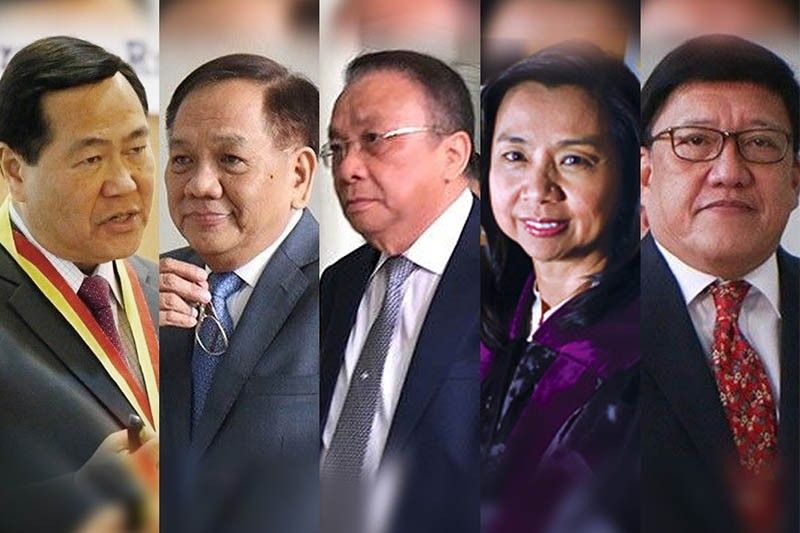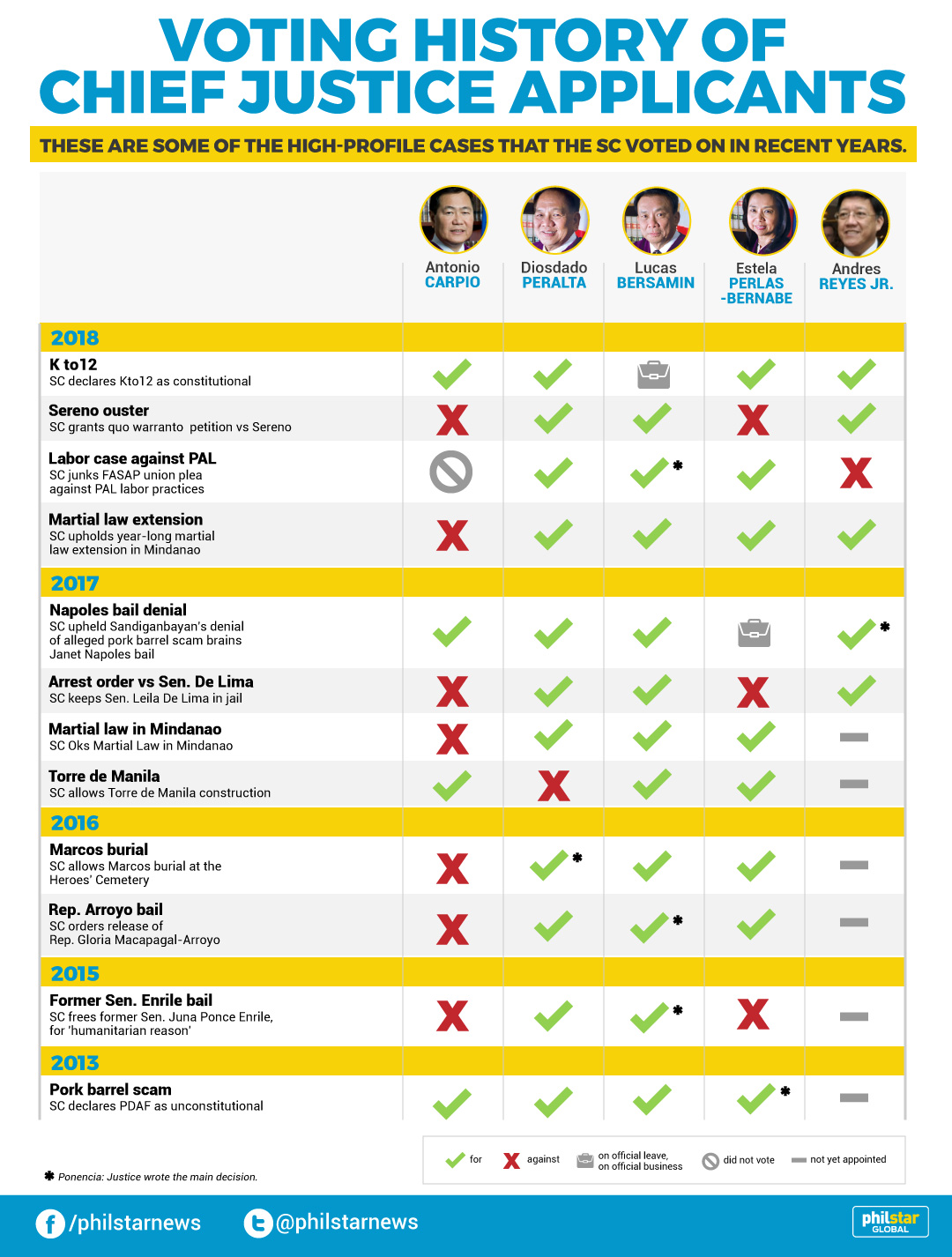Who's who: A look at chief justice aspirants

MANILA, Philippines — Aspirants for the country’s top judge post, succeeding retired Chief Justice Teresita de Castro, would not face a public interview. This, after the Judicial and Bar Council agreed that senior justices need no longer go through one.
Past public interviews for SC justice—and even ombudsman—aspirants centered on the applicants’ reform plans in the institution, their wealth declaration documents, oppositions filed to their candidacy and their opinion on controversial cases.
But Justice Secretary Menardo Guevarra said on October 22 that the JBC has allowed closed-door interviews for the five most senior justices and those who have served the tribunal for at least five years.
This after a Supreme Court en banc resolution “expressing its sentiment that senior justices of the supreme court vying for the chief justice position should be exempted from public interviews.”
The justice chief, a member of the JBC by virtue of his position, shared that a majority of the council's members opined that SC justices were already subjected to a public interview when they applied for a seat at the high tribunal.
Guevarra said that the JBC panel would conduct the closed-door interview with the five chief justice aspirants on Friday.
Here is a quick look into the profiles of the chief justice aspirants and how they voted in some of the high-profile cases at the high court:
Antonio Carpio
Retirement: October 26, 2019
Carpio hails from Davao. He has been with the SC for 17 years, since October 26, 2001. Carpio is a University of the Philippines graduate. He ranked sixth in the 1975 Bar examinations.
In 1992, he was appointed as former President Fidel Ramos’ Chief Presidential Legal Counsel where he worked on major reforms in telecommunications, shipping, civil aviation and insurance industries.
Carpio is part of the Philippines’ legal team who argued and won the case on the West Philippine Sea before a United Nations-backed tribunal in 2016.
The justice has been going around the country and abroad to give lectures on the maritime dispute. He has often been at odds with President Rodrigo Duterte, who opted for a friendlier stance with China on the maritime dispute.
READ: Does Carpio stand a chance to be the next chief justice?
Diosdado Peralta
Retirement: March 27, 2022
Peralta started his career in the government as an assistant city fiscal in Laoag City. He was assigned to the Manila prosecutor’s office a year later.
In 1994, Peralta was appointed as a criminal court judge in Quezon City. Among the cases he handled were heinous crimes and drug-related cases. During his stint as a judge, he received several commendations.
According to his profile, Peralta was “Bar reviewer, professor, lecturer and resource person in Criminal Law, Criminal Procedure, Remedial Law and Trial Technique in notable universities.”
Peralta penned the SC ruling that allowed the burial of the late dictator Ferdinand Marcos' remains at the Libingan ng mga Bayani.
Lucas Bersamin
Retirement: October 18, 2019
Bersamin, a graduate of the University of the East law school, finished the 1973 Bar Exams as the ninth placer with an average of 86.3%.
In November 1986, he was appointed as a trial court judge for which he received the Chief Justice Jose Abad Santos Award (Outstanding RTC Judge) in 2002. In 2000, he bagged the Best Decision in Civil Law and Best Decision in Criminal Law recognitions.
Among the most notable cases that Bersamin penned at the SC were the ruling that granted former Sen. Juan Ponce Enrile bail due to humanitarian grounds and the decision that there was no illegal retrenchment of more than 1,000 flight attendants and stewards of the Philippine Airlines.
Estela Perlas-Bernabe
Retirement: May 14, 2022
Estela-Bernabe graduated from the Ateneo College of Law as salutatorian. She passed the Bar in 1976.
She practiced legal work for China Banking Corp., Paramount Finance Corp., and the National Home Mortgage Finance Corporation from 1978 to 1993.
In 1996, she was appointed as Metropolitan Trial Court Judge in Makati, then was appointed to Makati Regional Trial Court in 2002. After four years, she became a justice of the appellate court.
She wrote the 2013 decision that held that the Priority Development Assistance Funds (PDAF) or congressional pork barrel unconstitutional.
Andres Reyes Jr.
Retirement: May 11, 2020
Reyes is the most junior among the five aspirants for the top judge post. He has been with the SC for a little more than a year.
Before assuming the post at the high tribunal he has worked as the presiding justice of the Court of Appeals and served the Metropolitan Trial Court in Makati City, Regional Trial Court of Makati City and Regional Trial Court of San Mateo, Rizal.
As the top judge of the appellate court, Reyes issued a joint statement with former Chief Justice Maria Lourdes Sereno over the detention of the six employees of the Ilocos Norte local government. Rep. Pantaleon Alvarez, House speaker at the time, called the CA an “inferior court” and questioned its stand to release the “Ilocos Six.”

- Latest
- Trending






























